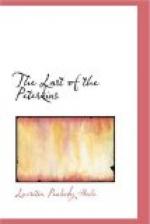* * * * *
My commonplace-book ought to show me what to do for common things; and then I can go to lectures, or read the “Rules of Emergencies” for the uncommon ones.
Because, as a family, I think we are more troubled about what to do on the common occasions than on the unusual ones. Perhaps because the unusual things don’t happen to us, or very seldom; and for the uncommon things, there is generally some one you can ask.
I suppose there really is not as much danger about these uncommon things as there is in the small things, because they don’t happen so often, and because you are more afraid of them.
I never saw it counted up, but I conclude that more children tumble into mud-puddles than into the ocean or Niagara Falls, for instance. It was so, at least, with our little boys; but that may have been partly because they never saw the ocean till last summer, and have never been to Niagara. To be sure, they had seen the harbor from the top of Bunker Hill Monument, but there they could not fall in. They might have fallen off from the top of the monument, but did not. I am sure, for our little boys, they have never had the remarkable things happen to them. I suppose because they were so dangerous that they did not try them, like firing at marks and rowing boats. If they had used guns, they might have shot themselves or others; but guns have never been allowed in the house. My father thinks it is dangerous to have them. They might go off unexpected. They would require us to have gunpowder and shot in the house, which would be dangerous. Amanda, too, is a little careless. And we never shall forget the terrible time when the “fulminating paste” went off one Fourth of July. It showed what might happen even if you did not keep gunpowder in the house.
To be sure, Agamemnon and Solomon John are older now, and might learn the use of fire-arms; but even then they might shoot the wrong person—the policeman or some friends coming into the house—instead of the burglar.
And I have read of safe burglars going about. I don’t know whether it means that it is safe for them or for us; I hope it is the latter. Perhaps it means that they go without fire-arms, making it safer for them.
* * * * *
I have the “Printed Rules for Emergencies,” which will be of great use, as I should be apt to forget which to do for which. I mean I should be quite likely to do for burns and scalds what I ought to do for cramp. And when a person is choking, I might sponge from head to foot, which is what I ought to do to prevent a cold.
But I hope I shall not have a chance to practise. We have never had the case of a broken leg, and it would hardly be worth while to break one on purpose.
Then we have had no cases of taking poison, or bites from mad dogs, perhaps partly because we don’t keep either poison or dogs; but then our neighbors might, and we ought to be prepared. We do keep cats, so that we do not need to have poison for the rats; and in this way we avoid both dangers,—from the dogs going mad, and from eating the poison by mistake instead of the rats.




